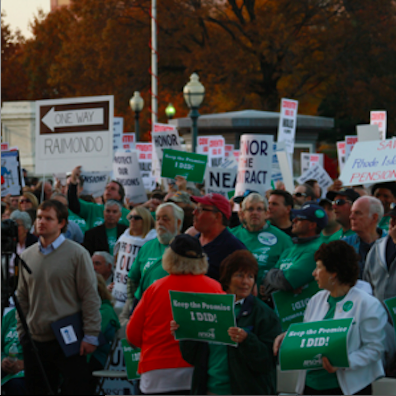Russ Moore: Will Fundraising Conflict with Raimondo’s Ethics Rhetoric?
Monday, January 19, 2015
Russell J. Moore, GoLocalProv MINDSETTER™
It was encouraging to see that Governor Gina Raimondo's first action as Governor was to sign an executive order declaring that all state employees and appointees within the executive branch of government must adhere to the highest ethical standards.
Throughout her impressive gubernatorial campaign Raimondo consistently talked about the importance of ethics and a movement away from the insider dealings and culture of cronyism that has undoubtedly plagued Rhode Island for so long.
That's a message that assuredly resonated with the Rhode Island electorate, the super majority of which don't have insider connections to get them or their family cushy jobs, lucrative contracts, or prestigious government appointments.
GET THE LATEST BREAKING NEWS HERE -- SIGN UP FOR GOLOCAL FREE DAILY EBLAST
Instead, the average Rhode Islanders are forced to muddle through an economy that under performs, being the first one into recessions and the last to leave, in part due to the fact that business leaders (small and large) don't want to get involved with a state where knowing someone, or making the right campaign contributions are a prerequisite to doing business. Nor do they appreciate the high taxes that result from the pandering to highly organized special interest groups that takes place by the state's elected officials who expect those favors to be repaid at the ballot box.
Nobody wants to come out and say it, but the biggest reason why so many communities are teetering on the brink of bankruptcy is because the mayors and city councils throughout the state have been extremely generous with public money at the expense of taxpayers. In other words, they've bought votes with the public treasury.
That's why it was encouraging to see Raimondo take on pension reform back in 2011. Raimondo showed courage and took a lot of criticism, but the state is better off because the taxpayers simply couldn't afford the cost of state's retirement program any longer. (How she managed the state pension system's investment is another story and paid exorbitant fees is another story, don't get me wrong.)
Yet that being said, and while Raimondo's rhetoric at her inauguration was encouraging, it remains to be seen whether her actions will rise above the level of just words. Adhering to the highest level of ethics is not going to be easy for Raimondo given her knack for prolific fundraising.
That’s because the people who donate big money to politicians do so expecting something in return.
Just four days after her inauguration, Rhode Island attorney Jon Savage, sent out a fundraising email stating that was hosting a luncheon at the prestigious University Club, located in; you guessed it, Providence's East Side. The event took place last Thursday. Anyone and everyone were welcome, as long as they had a check for $1,000 written out to the Governor's campaign account in hand.
The email states that Governor Raimondo will go on to do great things as Governor, but to do so she needs the "continued support" of donors. Why does Raimondo need campaign contributions to do great things is beyond comprehension?
It shouldn’t surprise anyone that Savage’s law firm, Shechtman Halperin Savage, have received state contracts in the past with entities such as the Commerce Corporation. Savage is also the Chairman of the Board of Directors of the RI Airport Corporation--an appointment that comes from the governor. By raising literally tens of thousands of dollars for the Governor, is it really that far of a stretch to call that pay to play?
But why pick on Savage? Let's face it, I'm sure there are a few people here or there who donate to political candidates who do so out of convictions. But most of the people on the fundraising circuit donate out of self-interest.
If Raimondo really wants to set an ethical example, she should make a pledge to refuse to accept any donations from people who work, or do business with the state government, and any of their family members. In other words, she should refuse donations from anyone who tries to get taxpayer's money into their hands. That would eradicate any potential conflict of interest, and would set a shining ethical example.
Further, Raimondo should try to get this enshrined in state statute by proposing a Connecticut-style campaign finance reform law that would prevent lobbyists and state contractors and their immediate family members from donating money to politicians.
That would do far more for ethics than an executive order asking people to follow the laws. But I’m not holding my breath because if there's one thing Raimondo knows, it's the old adage "she who has the gold rules."
Russell Moore has worked on both sides of the desk in Rhode Island media, for both newspapers and political campaigns. Follow him on twitter @russmoore713. Send him email at [email protected]
Related Slideshow: 10 Questions Raimondo Has to Answer as Governor
 View Larger +
View Larger +
Prev
Next
Moving the needle?
Forbes recently ranked Rhode Island 5th worst in the country for business environment -- a not uncommon position for the Ocean State in recent years. Forbes placed RI as high as 20th for quality of life -- but #49 for "regulatory environment."
How soon can Governor-elect Raimondo improve Rhode Island's basement-level assessment and make it more competitive -- and what will she have to do to make that happen? Addressing the sales tax? Estate tax? Look to Raimondo's State of the State address -- and first budget proposal -- for signs as to how the direction the new Governor plans on taking the state.
 View Larger +
View Larger +
Prev
Next
Gambling hole?
As GoLocal's Stephen Beale pointed out, RI has no plan to deal with $307,000,000 shortfall, when casinos in MA are operational, and RI's third largest source of revenue -- gaming and the Division of Lottery -- will take a huge hit. "A consultant's report showed Rhode Island losing $108.8 million a year in casino gaming revenue by 2017. And that was a best case scenario. The worst case had the state bleeding $158.4 million by 2017," wrote Beale.
How will Governor-elect Raimondo deal with the 800-pound gorilla in the room? Newport Grand failed in its bid for table games on the ballot in November. Will Raimondo let the General Assembly continue to prop up the ailing slots parlor?
 View Larger +
View Larger +
Prev
Next
RhodeMap RI?
The previously little-known economic development plan under the State's Division of Planning -- made possible by a federal HUD grant -- has heated up in a big way as opponents are voicing their concerns as to the scope and reach of the plan, if incorporated into the state's broader economic plan.
Will Governor-elect Raimondo get behind RhodeMap RI's vision fully, and how would she address detractors who don't appear to be going away at any point soon? Given that there will most likely need to be legislative components to implement the plan, watch to see where Raimondo's leadership is on this issue.
 View Larger +
View Larger +
Prev
Next
Marijuana legalization?
Some of the air came out of the marijuana legalization balloon when former Speaker of the House Gordon Fox stepped down last year, and the notably more conservative Speaker Nicholas Mattiello took the helm, making the prospect of a marijuana legalization bill appear dim, at best.
The Daily Chronic reported that the Democratic gubernatorial candidates indicated during the campaign that they were "monitoring the effects of regulation and taxation in Colorado and Washington." Raimondo's certainly given no indication she'd be inclined to consider a tax-and-legalize measure, but as gaming revenues start to taper off, will marijuana discussion ramp up as a new revenue option?
 View Larger +
View Larger +
Prev
Next
Union relations?
While Raimondo appointed five transition team members with big banking ties, she also appointed two union heads -- Pat Quinn with SEIU 1199 and Michael Sabitoni with the RI Building and Construction Trades Council.
While Raimondo managed to secure union endorsements following a primary that saw them go primarily to opponents Angel Taveras and Clay Pell, the legacy of her pension reform still looms large (remember AFSCME famously hired Forbes' Edward Siedle to investigate Raimondo's handling of the state pension fund, namely her move into hedge funds). How will Raimondo negotiate with public sector unions given a past history?
 View Larger +
View Larger +
Prev
Next
Pension Lawsuit?
What will come of the pension reform lawsuit? While it was quiet leading up to the election following the failed settlement earlier in the year, watch to see the next steps from Raimondo -- and newly elected Treasurer Seth Magaziner (who appointed a fairly union-friendly transition team) to see what attempts may arise to reach a new settlement -- and what implications that may mean for Raimondo, the architect of the landmark 2011 pension overhaul. Depending on the outcome, watch to see how Raimondo's political star rises -- or falls -- from the outcome of the suit -- and how Raimondo addresses the financial implications if a mediated settlement is achieved.
 View Larger +
View Larger +
Prev
Next
Budget proposal?
All eyes will be on Raimondo's first budget proposal in January. What will her priorities be? Will there be bold moves to improve the state's business climate? Education, infrastructure, tax code -- how will Raimondo choose to tackle the state's biggest issues? And will the Democratic leadership agree with her agenda?
 View Larger +
View Larger +
Prev
Next
General Assembly?
For the first time since 1991 -- when Governor Bruce Sundlun took office -- a Democrat will be embarking on a gubernatorial administration, and Raimondo will be working with a Democratic legislature. What will Raimondo's working relationship be with Speaker Mattiello and Senate President Paiva-Weed? Will the General Assembly be in lockstep with a Raimondo agenda -- if not, what will the points of contention be? And with a democratic lock on power, what will the Republicans be able to accomplish?
 View Larger +
View Larger +
Prev
Next
Mandate issue?
Winning the general election to become Rhode Island's first female Governor with 40% of the vote, Raimondo follows in the footsteps of Governor Lincoln Chafee with winning with less that 50% of the vote. Raimondo however has the advantage over her predecessor by being elected as a Democrat, allowing her to work with leadership in the General Assembly. However, with 40% of the vote, how will the public who didn't vote for her view here policies and proposals? Will Raimondo have to win over the public, or will Raimondo take her support from the business community and forge a path regardless?
 View Larger +
View Larger +
Prev
Next
Transparency?
While General Treasurer, Raimondo came under fire for lack of transparency for the lack of disclosure of hedge fund fees paid for the state's retirement investments, punctuated by Attorney General Peter Kilmartin ruling that Raimondo could keep certain details of the state's investments from the press. Forbes' Edward Siedle wrote, Does [Kilmartin] seriously believe that hedge and private equity billionaires entrusted with state workers retirement savings should be shielded from scrutiny regarding potential violations of law?
While Raimondo will no longer be calling the shots as the head of the State Investment Commission, all eyes will be her decisions in the Governor's office. How transparent with the Raimondo administration be with the press-- and the public?
Related Articles
Enjoy this post? Share it with others.

























